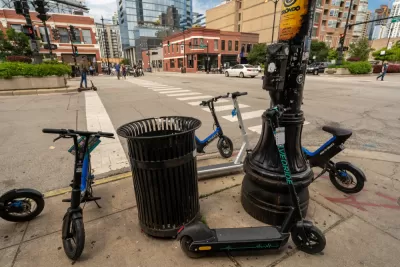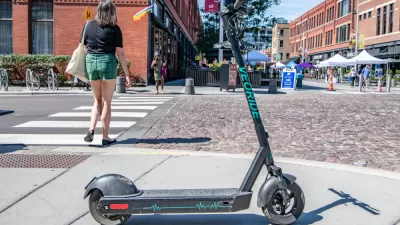Chicago's heavily debated electric scooter rental pilot comes to a close today. The debate about how to treat electric scooter rentals in the future also begins today.

"The four-month electric scooter pilot in Chicago, both celebrated and reviled by residents, comes to an end Tuesday," according to an article by Mary Wisniewski
"As of last week, people had taken 772,450 rides on electric scooters, according to the city’s Department of Business Affairs and Consumer Protection. That’s about 7,000 trips a day."
According to Wisniewski, the pilot program was intended to assess the effectiveness of scooters in facilitating public transit rides. Wisniewski characterizes the lessons of that experiment as a subjective, mixed bag.
As for what's in store for electric scooters in Chicago, Wisniewski writes that groups like the Active Transportation Alliance are already on the case. "In a new report, the Active Transportation Alliance said if Chicago decides to try scooters again, it should continue to keep them out of the central business district, and require them to be parked in docks or corrals, or locked to fixed objects."
A separate opinion piece, published by the same media outlet and written by University of Illinois Chicago Associate Professor of Planning Kate Lowe, makes an argument that planning for scooters requires perspective: "Regulators must ensure that scooters are equitably accessible, but scooters may not be the most needed transit solution in less dense and less wealthy communities of color. Policymakers should ask residents what would be."

Maui's Vacation Rental Debate Turns Ugly
Verbal attacks, misinformation campaigns and fistfights plague a high-stakes debate to convert thousands of vacation rentals into long-term housing.

Planetizen Federal Action Tracker
A weekly monitor of how Trump’s orders and actions are impacting planners and planning in America.

San Francisco Suspends Traffic Calming Amidst Record Deaths
Citing “a challenging fiscal landscape,” the city will cease the program on the heels of 42 traffic deaths, including 24 pedestrians.

Defunct Pittsburgh Power Plant to Become Residential Tower
A decommissioned steam heat plant will be redeveloped into almost 100 affordable housing units.

Trump Prompts Restructuring of Transportation Research Board in “Unprecedented Overreach”
The TRB has eliminated more than half of its committees including those focused on climate, equity, and cities.

Amtrak Rolls Out New Orleans to Alabama “Mardi Gras” Train
The new service will operate morning and evening departures between Mobile and New Orleans.
Urban Design for Planners 1: Software Tools
This six-course series explores essential urban design concepts using open source software and equips planners with the tools they need to participate fully in the urban design process.
Planning for Universal Design
Learn the tools for implementing Universal Design in planning regulations.
Heyer Gruel & Associates PA
JM Goldson LLC
Custer County Colorado
City of Camden Redevelopment Agency
City of Astoria
Transportation Research & Education Center (TREC) at Portland State University
Jefferson Parish Government
Camden Redevelopment Agency
City of Claremont




























